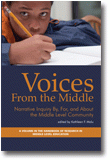
Voices from the Middle
Narrative Inquiry By, For and About the Middle Level Community
Edited by:
Kathleen F. Malu, William Paterson University
A volume in the series: The Handbook of Research in Middle Level Education. Editor(s): Steven B. Mertens, Illinois State University. Micki M. Caskey, Portland State University.
Published 2010
The need for continued research at the middle level is clear and urgent. The previous volumes in this Handbook series testify to this urgency. While quantitative studies continue to be essential, there is a critical need to understand the complexities of the middle level community. One way to capture the rich, diverse mosaic of the voices and experiences of middle level participants and stakeholders is to use narrative inquiry methodology. The intent of this volume in The Handbook is to give voice to and broaden our understanding of the wide variety of participants and stakeholders who weave through the middle level. Such participants and stakeholders may include middle level teachers, school psychologists and counselors, students, parents, administrators, middle level researchers, research foundations, and community groups. In addition to hearing directly from these groups, this volume will focus on the intricate webs, connections and questions that these narratives hold and frame them within current middle level research, theory, and practice. Ultimately this volume will highlight the nuance, diversity and future directions that research may need to explore.
CONTENTS
Preface, Stefinee Pinnegar and Cheryl Craig. Introduction: Narratives in the Middle, Kathleen F. Malu. Walking in the “Swampy Lowlands”: What It Means to be a Middle Level Narrative Inquirer, Jeong-Hee Kim. The Lived Experiences of Middle School English Language Learners: Shifting Identities Between Classrooms, Bogum Yoon. Xavier and the Bully Box: Immigrant Adolescent Girls in a Bully-Free World, Cathy Coulter. It’s Not Black and White: Stories of Lived Experience, Reading, and Assessments, Susan V. Piazza. Adolescent Readers’ Voices, Carole S. Rhodes. From Loathing to Love: Sandy’s Reading Journey, Mary Beth Schaefer. “This is the Way it is:” The Experiences of Preservice Middle School Teachers Integrating Instruction With High Stakes Test Preparation, Steven L. Turner. Reclaiming Camelot: Capturing the Reflections of Exemplary, Veteran Middle School Teachers in an Age of High Stakes Testing and Accountability Through Narrative Inquiry, Nancy Fichtman Dana, Darby Claire Delane, and Paul George. Teaching to the Middle in Australia: Four Teachers Tell Their Stories, Nan Bahr and Donna Pendergast. Reflections on Shared Middle Level Experiences: A Case Study, Shirley M. Matteson, Richard M. Fletcher, Tamera Tidwell, and Doris I. Garrett. The Middle Level Literacy Coach: Navigating Multiple Roles in Context, Anthony T. Smith. Middle Level Education Through the Window of a Writer’s Workshop: Developmentally Responsive Education, Rita S. Brause. Can a K-8 School Address the Needs of Adolescents? Nancy Bell Ruppert. “Sit Tight”: The Uneasy Alliance Between Freedom and Control in a Middle School Classroom, Ruth Vinz. Parent Involvement and Student Success: Black and White in the Middle, Kathleen F. Malu. Locating an Authorial Voice: Engaging a School Reform Debate Through the Roles of Mother, Teacher, Community Member, and University Professor, Cynthia C. Reyes. The Family Learning Institute: Committed to Improving the Reading Skills of Middle Level Learners, Denise L. McLurkin. Recommendations and Resources for Narrative Inquiry and Research, Kathleen F. Malu. About the Authors.
-
Paperback978-1-61735-177-8
Web price: $62.04 (Reg. 72.99)
-
Hardcover978-1-61735-178-5
Web price: $89.24 (Reg. 104.99)
- eBook9781617351792

-
 An International Look at Educating Young Adolescents
An International Look at Educating Young Adolescents
-
 Common Planning Time in Middle Level Schools
Research Studies from the MLER SIG’s National Project
Common Planning Time in Middle Level Schools
Research Studies from the MLER SIG’s National Project
-
 Curriculum, Instruction, and Assessment
Intersecting New Needs and New Approaches
Curriculum, Instruction, and Assessment
Intersecting New Needs and New Approaches
-
 Equity & Cultural Responsiveness in the Middle Grades
Equity & Cultural Responsiveness in the Middle Grades
-
 Health and Well-Being in the Middle Grades
Research for Effective Middle Level Education
Health and Well-Being in the Middle Grades
Research for Effective Middle Level Education
-
 Preparing Middle Level Educators for 21st Century Schools
Enduring Beliefs, Changing Times, Evolving Practices
Preparing Middle Level Educators for 21st Century Schools
Enduring Beliefs, Changing Times, Evolving Practices
-
 Research on Teaching and Learning with the Literacies of Young Adolescents
Research on Teaching and Learning with the Literacies of Young Adolescents

